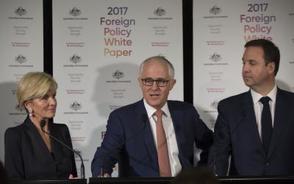 Source: www.https://www.pm.gov.au/media
Source: www.https://www.pm.gov.au/media The comments on Japan did include this particular line, though – “As close partners, each country is invested in the success of the other”. This is probably the clearest expression on where Australia sees its relationship with Japan going in quite some time. In an era where the established international order is being re-shaped by power rather than law, and where the greatest champion of the liberal international order is steadily retreating from that role, Australia has begun to cast its eye over the region to find nations that at least share its sense of values and which it believes will be able to best assist Australia in keeping something of the pre-existing order in the region intact.
Australia has already made overtures towards Japan to keep this momentum going by enthusiastically joining in the quadrilateral strategic dialogue, while fully aware that just by talking with the three other major democracies of the Indo-Pacific region it might incur the wrath of a suspicious Beijing. The question looming over this participation is, however, whether this enthusiasm for cooperation can be sustained if Australia undergoes a change in government. While the Labor Party has not dismissed the idea of participating in a quadrilateral dialogue, neither is it overly supportive of the idea, instead suggesting that it will observe whether the “Quad” actually improves the regional security situation before committing to remain a member of it.
The thing is, if the impetus is on the “Quad” to demonstrate that it contributes to regional security, on what basis will Labor decide that it is worth the effort? For example, if the “Quad” issues a statement expressing concern about China’s island building in the South China Sea and Beijing then issues a rebuke of that criticism, will that be proof to Labor that the “Quad” is disruptive and thus grounds for once again jettisoning Australia’s participation in the dialogue? And what will it say to the other members of the “Quad”? That they, and not China, are responsible for upsetting the regional order? That they are acting against the interests of stability? If Labor adopted that stance vis-à-vis the three other members of the “Quad”, then Australia might as well give up its place at all international forums. It will be obvious that it prefers to meekly back down rather than defend its values and so is unreliable as an international partner.
So much can be achieved by building relations with Japan that extend beyond economics, but if Australia balks every time it is faced with the prospect of incurring China’s wrath by cooperating with Japan (and India, and South Korea) on regional security issues, then it will have effectively surrendered its sovereign interests to Beijing and further damaged the cause of the international liberal democratic order for no real benefit. With Japan committed to expanding its role in the region, Australia must do all in its power to facilitate this, and that means actually pro-actively taking part in initiatives that Japan believes is important to regional stability.
While the Coalition remains in power this dedication will remain intact, but what happens should they lose the next federal election is anybody’s guess. Uncertainty breeds suspicion in the world of diplomacy, and suspicion is no basis for regional stability.
 RSS Feed
RSS Feed